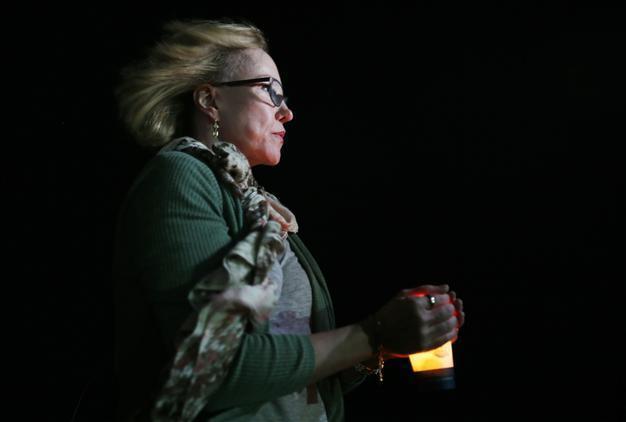UAE executes woman convicted of US teacher's murder
ABU DHABI - Agence France-Presse

In this Sunday, Dec. 7, 2014 file photo, Nancy Ray, an American expatriate, holds a candle during a vigil in memory of American schoolteacher Ibolya Ryan, who was killed in a December stabbing attack in the restroom of the Boutik Mall on the upscale Reem Island in Abu Dhabi, while participating in the commemorative gathering at a beach in Dubai, United Arab Emirates. AP Photo
The United Arab Emirates carried out a rare execution on July 13, putting to death by firing squad an Emirati woman convicted of the jihadist-inspired murder of a US school teacher, media reported.
Alaa Bader al-Hashemi, 30, was executed at dawn after President Sheikh Khalifa bin Zayed al-Nahyan approved the death sentence against her, said the official WAM news agency, citing prosecutors.
The National, an English-language daily, said Hashemi had been put to death by firing squad.
Hashemi was sentenced to death last month for stabbing to death mother of three Ibolya Ryan, 47, in a toilet of an Abu Dhabi shopping mall on December 1, 2014.
Dubbed the "Reem Island Ghost" after the location of the mall, Hashemi was also convicted of placing a handmade pipe bomb outside an Egyptian-American doctor's home in Abu Dhabi.
The device failed to explode.
In the verdicts issued in June, the Federal Supreme Court in Abu Dhabi said Hashemi had used an Internet account to spread information that was likely to "jeopardise" the United Arab Emirates.
She was also found guilty of having sent funds to Al-Qaeda in Yemen, knowing that this money would be used for "terrorist acts".
UAE law allows for capital punishment but executions are rare and death sentences are usually commuted to life in prison.
Hashemi's execution is the first in the oil-rich Muslim federation since January 2014 when a Sri Lankan was put to death by firing squad in for murdering an Emirati man eight years earlier.
Before his sentence was carried out, rights watchdog Amnesty International had reported last year that a dozen people had been executed in the UAE since 1997.
Hashemi was arrested 48 hours after the attacks in Abu Dhabi.
Security forces tracked her down using CCTV footage of her going into and out of the restroom where the murder occurred and near the doctor's building.
She was dressed in black from head-to-toe.
Hashemi was taken into custody at her home where her car was found with blood on the steering wheel and bomb-making materials inside.
During her trial, Hashemi had asked the court to provide her with psychological help, saying she had "unreal visions" and would see "ghost-like people" due to a chronic mental illness.
The court ordered psychiatric tests which it said showed she was aware of her actions.
In March, Attorney General Salem Saeed Kubaish said investigators found she had "listened to lectures by late Al-Qaeda leaders Osama bin Laden and Abu Musab al-Zarqawi, watched video clips of killings and beheadings," among other similar activities.
She "embraced takfiri and jihadist ideology and then engaged in terrorist acts in support of the terrorist organisations Al-Qaeda and Daesh," he said using an Arabic acronym for Islamic State of Iraq and the Levant (ISIL).
In September, the United Arab Emirates joined the US-led coalition carrying out air strikes against the jihadist ISIL in Iraq and Syria.
Last year, it issued a list of 83 Islamist groups it classified as "terrorist organisations".
Hashimi's execution is the first to be carried out under a federal law promulgated last year concerning terror-related offences, according to the Gulf News daily.
Violent crime is relatively rare in the Gulf federation, home to millions of foreign workers.
